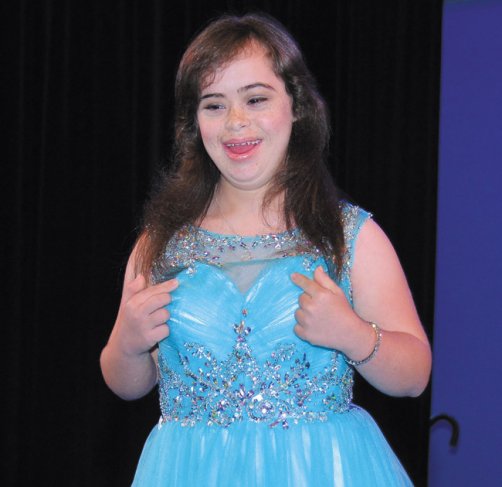No Holding Back This New Princess
On Aubrey McKenzie’s Facebook page is a quote, “A child is like a butterfly in the wind. Some can fly higher than others, but each one flies the best it can. Why compare one against the other? Each one is different. Each one is special. Each one is beautiful.”
Aubrey McKenzie, 16, is, as in the quote, different, special and beautiful. Last month, she was crowned “Miss Hawaii Princess United States 2015” after performing a signing routine to A Dream is a Wish Your Heart Makes from Cinderella.
But why would a Pearl City High School junior winning a pageant title be at all special, except to doting relatives?
The answer is both simple and complex. Simply, Aubrey was born with Down syndrome, a condition that comes with a long checklist of obstacles — in Aubrey’s case, among others, being hearing impaired. Simply, according to her Facebook page, Aubrey is the only teen in the country with Down syndrome to hold such a title, earning congratulations to Aubrey and to Desi, her mom.
More complex is Down syndrome and how it is still misunderstood, which is why the story made it onto this page.
When MidWeek editor Don Chapman suggested I write about Aubrey, I pushed back, “It’s certainly inspiring, but more a ‘blurb’ than a column.” To myself I said, please, not another pageant story for this former “pageant person” to write.
Then, I decided to research Down syndrome. I voraciously prowled the ‘Net for information about its physical indicators, history and future. I read testimonies of the struggles of parents coping with complex medical procedures, lifesaving surgeries and the emotional distress of unfulfilled dreams for their darling children. Many of these difficult challenges Desi, a single working mom, has faced. Desi is a choir teacher whose child cannot hear.
As a parent and grandparent, I can understand. Suddenly, the “blurb” became more than could be contained in this space.
An extra copy of chromo-some 21 alters genetic development in a person with Down syndrome. There are around 400,000 Down syndrome Americans living in the U.S. today and that number may decrease. According to a May 2007 New York Times article by Amy Harmon, “About 90 percent of pregnant women who are given a Down syndrome diagnosis have chosen to have an abortion.” Many doctors now recommend that all pregnant women get the test, not just those over 35.
The 20th century wasn’t sympathetic to people with disabilities until 1990, when the Americans with Disabilities Act was signed by President George H.W. Bush. Woven into Aubrey’s good news story also is one of a nation’s shameful discrimination, misunderstanding, murder by neglect and forced sterilizations.
Well into the 1980s, certain doctors still advised parents to let newborns with Down syndrome die. In the sensational case of “Baby Doe” in 1981, doctors advised Indiana parents to forgo surgery of a blocked esophagus because their newborn had Down syndrome. A legal intervention was attempted, but the baby had starved to death.
For much of the century, children with Down syndrome were routinely institutionalized in unspeakable “homes,” where they were minimally educated, medically experimented on and at times neglected and abused, both physically and sexually.
Only 76 years ago, Adolf Hitler’s Nazi government decided to wipe out what he deemed “life unworthy of life” using a euthanasia program (code name Aktion T4), killing more than 200,000 people, mostly with Down syndrome, but also with illnesses and other disabilities.
Today, some people are concerned that prenatal Down syndrome testing and its resulting abortions is a stealth version of Hitler’s scheme to rid the world of imperfections and/or eliminate high medical costs related to Down syndrome.
And that brings me to Aubrey and all the other folks with Down syndrome, who, like us all, are so imperfectly perfect.
Plug your ears and imagine doing interpretive sign language to music you cannot hear. Imagine a diminutive figure in a fluffy, ocean-blue dress on a huge stage gracefully moving her hands to:
“No matter how your heart is grieving, if you keep on believing, the dream that you wish will come true.”
Thank you, Don, for giving me this story — a real live Cinderella tale with an eye-opening twist. Today is a better day.
susanpagecoffee@gmail.com






